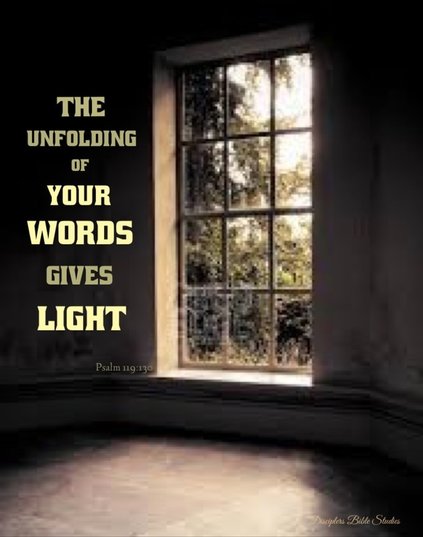 Have you ever had the experience of being alone in a room that is so dark you can’t even see your hand in front of your face? If you have, you know that darkness causes you to become disoriented. Your mind becomes perplexed and loses perspective. It becomes impossible to make rational judgments because EVERYTHING is unknown, untested, untried, and unsure. Even if you’re not alone, if someone else is in the room with you, it actually doubles the problem because you both lose your bearings and become confused. Try to imagine living in a world with no physical light -- no sun, moon, stars, electric lights, flashlights, or candles -- just pitch darkness. How grateful would you be for one small match to light your way? Did you ever think that is how the world would be without God’s Word? John 1:15 tells us that in Jesus is the Word, in Him was life, and the life was the light of men. In Acts 26:18, God sent the apostle Paul to preach the gospel to the Gentiles to open their eyes, in order to turn them from the power of Satan to God, that they may receive forgiveness of sin. Colossians 1:12-13 tells us that as believers, our inheritance is in the light because God has delivered us from the power of darkness and Ephesians 5:8 reminds us to walk as children of light because we were once darkness, but now we are light. Our world is filled with darkness. But the Bible also tells us that God has given us the prophetic word made sure, to which you do well to pay attention as to a lamp shining in a dark place….(2 Peter 1:19). It is His Word that lights the world and enlightens our hearts. In this stanza of Psalm 119, the psalmist writes of God’s wonderful (119:129) words giving light. 129 Your testimonies are wonderful; Therefore my soul observes them. 130 The unfolding of Your words gives light; It gives understanding to the simple. 131 I opened my mouth wide and panted, For I longed for Your commandments. 132 Turn to me and be gracious to me, After Your manner with those who love Your name. 133 Establish my footsteps in Your word, And do not let any iniquity have dominion over me. 134 Redeem me from the oppression of man, That I may keep Your precepts. 135 Make Your face shine upon Your servant, And teach me Your statutes. 136 My eyes shed streams of water, Because they do not keep Your law. Do you remember back in Psalm 119:105 the psalmist wrote that God’s word was a lamp to his feet and a light to his path. It lit his way so he could see clearly. But in the present stanza, he reveals that God’s word is also an inner light to his soul. This inner light gives understanding, even to simple folks (119:129-130). It also instills an inner longing for more of God’s word (commandments, 119:131). The psalmist’s longing for God’s word is so intense he says, I opened my mouth wide and panted (119:131). This made me think of a thirsty traveler in the desert panting for water. Just as a human body needs water to survive, the soul is sustained by God’s Word. How intense is your longing for the sustenance of your soul? The psalmist loves God’s name (119:132), meaning he loves God himself and everything about God. He longs to stay true to God’s word, where God reveals Himself to us, so he does not sin. He asks God to establish is footsteps in Your word (119:133) and to protect him from those who might lead him away from it (119:134). How much do you love and honor God’s name? How much of a priority is it for you to establish your footsteps firmly in His Word so you do not fall into sin (119:132-133)? How often do you pray and ask God to keep you from sin so you can stay true to His Word (119:133-134)? In this dark world, there are many who walk in darkness because they have no desire for God’s word to light their path and illumine their soul. The psalmist says it causes him to mourn (my eyes shed streams of water) when others do not keep God’s law. Would he shed tears for you? Who would you shed tears for now that you have read this portion of Psalm 119? What truths of God’s Word will you share with that person this week to bring some light into their world? God’s words are indeed wonderful (119:129). They give light in the darkness. Without them, people are hopelessly lost in the dark. Blessings, Suzie
0 Comments
 I just noticed something this week as I’ve been considering this 16th stanza of Palm 119. The psalmist refers to himself three times as a servant of the LORD. When I saw that, I looked back at the earlier part of the psalm and noticed he had called himself a servant of the LORD eight times before (119:17, 23, 38, 49, 65, 76, 84, 91). So what does that mean? What exactly is a servant? Looking it up in the dictionary, I found that a servant is “a person who performs duties for others….a devoted and helpful follower or supporter.” In a Christian context, I have heard it said that a servant is a person who desires to make someone else successful. In that context, would you describe yourself as a servant? In what ways is your life promoting the success of someone or some thing? Every single one of us is a servant to some “one” or some “thing”. Stop and think about it.
121 I have done justice and righteousness; Do not leave me to my oppressors. 122 Be surety for Your servant for good; Do not let the arrogant oppress me. 123 My eyes fail with longing for Your salvation And for Your righteous word. 124 Deal with Your servant according to Your lovingkindness And teach me Your statutes. 125 I am Your servant; give me understanding, That I may know Your testimonies. 126 It is time for the Lord to act, For they have broken Your law. 127 Therefore I love Your commandments Above gold, yes, above fine gold. 128 Therefore I esteem right all Your precepts concerning everything, I hate every false way. This portion of Psalm 119 is a beautiful picture and example of what it means to be a servant of the Lord and not a servant of self, sin, or worldly ways. First, notice what the psalmist says about himself. He has done justice and righteousness (119:121). This would mean walking in obedience to what he has learned in God’s Word. Of course, even if we try our hardest, none of us is perfect in that regard, are we? But the Bible tells us that God does not look at the outward person. He looks at the heart (1 Samuel 16:7). Those whose hearts have been washed clean through faith in Christ and His sacrifice will live in trust and obedience to Him and are accepted as righteous by God. It's as the apostle Paul wrote, I have been crucified with Christ; it is no longer I who live, but Christ lives in me; and the life which I now live in the flesh I live by faith in the Son of God, who loved me and gave Himself for me (Galatians 2:20). Secondly, the psalmist longs for God’s salvation and for His righteous word. It is a longing so deep and so strong that he says, My eyes fail from seeking…(119:123). Old Testament believers had an earnest expectation of God’s salvation in the promised Messiah and they longed for His coming. But the writer of Hebrews tells us they did not receive the promise because God had provided something better for us, that they should not be made perfect apart from us (Hebrews 11:39-40). The psalmist longed for a promise that he never received in his lifetime, but he never gave up. He clung to God’s righteous word, longing to understand His testimonies (119:125). He loved God’s commandments more than worldly things (119:127) and considered all His precepts to be right (119:128). We have received the promise of salvation the saints of old longed for. Christ has come for salvation and we have seen how right and true all of God promises have been. How much more should we seek Him with all our hearts and wait on Him. Have your eyes ever failed from spending hours in God’s Word, seeking out His truth and longing to obey it? Just how strong is your longing? The third truth to grasp from this passage is the psalmist’s reliance upon God to fight his battles. He prayed, Be surety for Your servant for good; Do not let the arrogant oppress me (119:122). He asked God to show him lovingkindness and act promptly on his behalf against those who had broken Your law (119:124, 126). The psalmist put his trust in God and lived according to the proverb, Do not say ‘I will repay evil’; Wait for the Lord, and He will save you (Proverbs 20:22). Do you stubbornly try to fight your own battles? Do you let resentment and anger brew into bitterness in your heart? Or do you humbly give your stress and distress to God and trust Him to deal with any injustice against you? Are you familiar with Hezekiah’s story in 2 Kings 18 and 19? If not, I hope you will read it. Sennacherib, king of Assyria, had sent his cruel servant Rabshakeh to Jerusalem to take the city, by force if necessary. From outside the city walls, Rabshakeh called loudly for surrender with words that were a reproach [to] the living God (2 Kings 19:4, 16). Later he wrote a blasphemous and threatening letter to King Hezekiah who responded by laying Rabshakeh’s letter before God and praying for deliverance. Read 2 Kings 19:35-37 to see what happened to The Assyrians and Sennacherib. God is able. Lay your hatred, your struggles, and your fears before Him. His promise is that He will save you (Proverbs 20:22). What better reason to turn from serving all that is in the world -- the lust of the flesh, the lust of the eyes, and the pride of life (1 John2:16) and begin serving the living God. Will you serve Him with all your heart as the psalmist did? And will you ease your burdened mind by trusting Him unconditionally to fight your battles? Your fellow servant of the Lord, Suzie |
SUZIE KLEIN
I have been involved in Disciplers since 1987, as a discussion leader, teacher, writer, and now as director. I am profoundly committed to the stewardship of this ministry which God has entrusted to me for a time. God’s word is the chief joy of my life. I cherish my personal time in the word, and I am filled with gratitude to be able to share His word with you, my fellow disciples in Christ. Categories |

 RSS Feed
RSS Feed